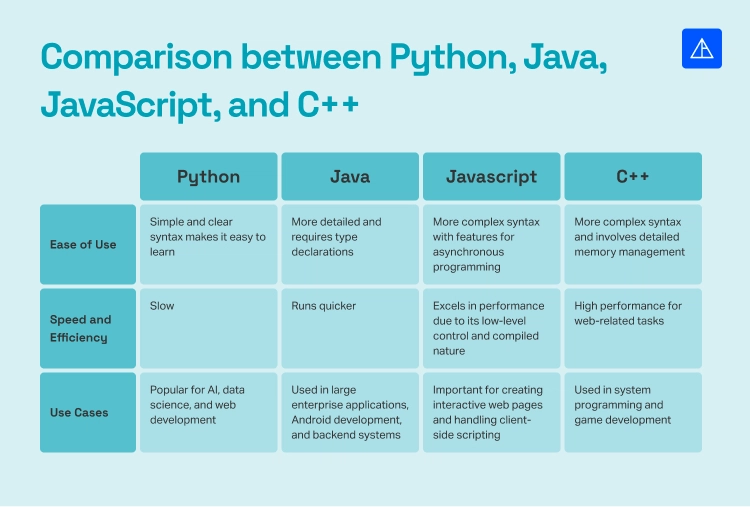Python’s role as the primary language for AI and machine learning projects is well-founded due to its extensive data-handling capabilities, flexibility, and portability. Recent data from Snowflake, as reported by Developer-Tech.com, highlights Python’s growing importance. The use of Python in Snowpark, Snowflake’s set of libraries, grew by 571% yearly.
It plays an essential role in AI, significantly enhancing real-life applications across various sectors. By engaging in Python, learners across all career stages can acquire valuable skills in building and implementing AI models.
5 Key Reasons AI Developers Choose Python
Here are the top five reasons why AI developers favour Python. Learn why aspiring developers should consider it:
1. Rich Ecosystem of Libraries and Frameworks
Python offers a wide range of libraries and frameworks for AI and machine learning. Tools like TensorFlow, Keras, PyTorch, and scikit-learn make it easier to build and run complex AI models. These resources help with tasks such as handling data, training models, and evaluating performance, speeding up the development process.
2. Easy-to-read and Manageable Code
Python’s clean and readable syntax makes it easy to maintain and understand code. This clarity helps developers write concise code, collaborate effectively, and solve problems more easily. Additionally, Python’s simple syntax supports quick prototyping and iterative development, which are crucial for advancing AI research and innovation.
3. Versatility and Seamless Integration
Python is a versatile language that supports multiple programming styles, such as procedural, object-oriented, and functional programming. This flexibility allows developers to choose the best approach for their AI projects. Python also integrates smoothly with other languages and technologies, making it an ideal choice for building complex systems with diverse components.
4. Robust Community Engagement
Python enjoys strong support from a large and active community of developers and researchers. This group provides valuable resources such as tutorials, forums, and open-source projects, benefiting both beginners and experienced AI developers. The community-driven aspect of Python helps keep it updated with the latest trends and technologies.
5. Extensive Documentation and Learning Resources
Another advantage of Python is its extensive documentation and learning resources. Detailed guides for libraries and frameworks, along with many online courses, tutorials, and books, help developers quickly gain the skills needed for AI projects. This broad support network makes it easier for newcomers to start with AI and supports continuous learning for experienced developers.
Comparing Python with Other Programming Languages
Trying to pick the right programming language? Let’s see how Python compares to some other popular choices like Java, JavaScript, and C++.

Python vs. Java
- Ease of Use: Python’s simple and clear syntax is great for beginners. Java, on the other hand, is more detailed and requires type declarations.
- Speed and Efficiency: Java generally runs faster because it’s compiled and utilises the Java Virtual Machine (JVM), while Python can be slower due to its interpreted nature.
- Use Cases: Python is popular for AI, data science, and web development. Java is commonly used in large enterprise applications, Android development, and backend systems.
Python vs. JavaScript
- Ease of Use: Python’s syntax is simple and easy to read, making it great for server-side development and data analysis. JavaScript, on the other hand, has a more complex syntax with features for asynchronous programming and is key for client-side web development.
- Speed and Efficiency: JavaScript provides high performance for web-related tasks, whether run in the browser or on the server with Node.js. Python is usually slower in web contexts but performs well in data-intensive applications.
- Use Cases: JavaScript is important for creating interactive web pages and handling client-side scripting. With Node.js, it can also be used for server-side development build full-stack JavaScript applications.
Python vs. C++
- Ease of Use: Beginners favor Python for its straightforward and easy-to-understand syntax; in contrast, C++ poses more challenges due to its complex syntax and detailed memory management requirements.
- Speed and Efficiency: C++ excels in performance with its low-level control and compiled nature, making it ideal for system-level tasks, games, and high-performance applications. Python, though slower due to its interpreted nature, enables faster development.
- Use Cases: Python is widely used for AI, web development, and scripting, while C++ excels in system programming, game development, and situations requiring high performance and precise resource control.
Real-World Uses of Python in AI
Here are the top three current real-world applications of Python used in AI:
Healthcare
Python is applied to medical imaging and predictive analytics. For medical imaging, Python aids in developing and deploying AI models that analyse X-rays and MRIs, helping diagnose diseases and conditions. In predictive analytics, Python facilitates data analysis and machine learning to forecast patient outcomes and design personalised treatment plans.
Retail and E-Commerce
Python boosts recommendation systems and inventory management. For recommendation systems, Python aids in building engines that suggest products based on user preferences and browsing history. In inventory management, Python-based AI models optimise stock levels and predict demand, helping retailers reduce costs and improve supply chain efficiency.
Automotive
Python is instrumental in developing autonomous vehicles and driver assistance systems. For autonomous vehicles, Python helps create and test algorithms for self-driving cars, including those for object detection, path planning, and decision-making. In driver assistance systems, Python helps develop advanced features such as lane-keeping and adaptive cruise control.
Top 3 Career Opportunities for Python Experts
Data Scientist
A Data Scientist dives into complex data sets to uncover insights and assist with decision-making. For this purpose, Python serves as a go-to tool for manipulating data, performing statistical analysis, and building machine learning models. Key skills include utilising Python libraries such as pandas, NumPy, and scikit-learn, as well as expertise in machine learning and data visualization.
Machine Learning Engineer
A Machine Learning Engineer designs, builds, and deploys machine learning models and systems. In this role, Python is essential for developing algorithms and integrating models into production environments. Key skills include working with Python frameworks such as TensorFlow and PyTorch, understanding machine learning algorithms, and utilising cloud platforms.
Data Analyst
A Data Analyst processes and analyses data to produce reports and visualisations. Python will assist you with data manipulation and generating insights that drive business decisions. Key skills include using Python libraries like Pandas and Matplotlib, as well as data querying and strong analytical abilities.
Learn Python and other relevant courses at Vertical Institute to grow your tech career and increase your earning potential. Master Python essentials in just 21 hours with flexible course schedules that fit around your work and commitments.
Related: Quickest Way to Learn Python: 8 Tips for Learning Python Fast
Conclusion
Python’s simplicity and powerful libraries make it an excellent choice for those looking to break into tech or upskill, particularly in AI. Its easy-to-learn syntax and supportive community ease the learning curve, strictly benefiting those working with Python used in AI and opening up new career opportunities in the tech world. Additionally, as generative AI gains traction across various industries, Python’s role becomes even more critical. Its rich ecosystem of AI frameworks enables professionals to develop and implement cutting-edge generative AI models, further broadening the scope of potential career paths.
About Vertical Institute
Vertical Institute is shaping the future of work by preparing individuals for tomorrow’s job market. Our courses and certification focus on teaching essential skills and nurturing the next generation of innovators and leaders.
As an Approved Training provider (ATO) accredited by SkillsFuture Singapore (SSG) and the Institute of Banking & Finance Singapore (IBF), our courses adhere to the highest standards. They are government-subsidised and eligible for SkillsFuture Credits or NTUC UTAP Funding.



